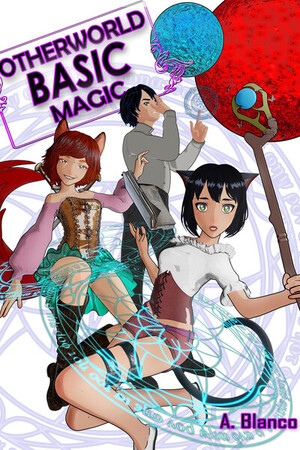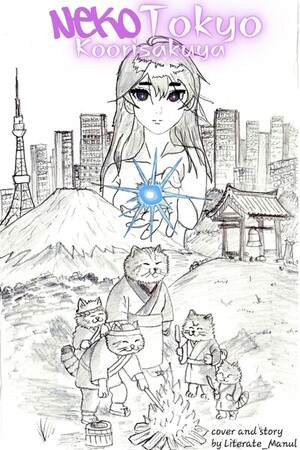Chapter 12:
Epilogue
The Doll In Horaji Ryokan
The hotel still stood.
From the outside, it looked almost majestic again—its spires touched the sky like unanswered prayers. But locals no longer spoke of it. They only looked.
The electric company had come and gone, pulling down live wires with the indifference of routine. No one protested. No one asked questions. Travelers snapped photos from afar, proud to say they had seen the legendary hotel, but none dared step beyond the gates.
Not anymore.
A small cemetery rested near the forest’s edge, wrapped in morning fog. There, Haruki stood quietly. One hand held a fresh bouquet of white lilies. The other, an old, worn collar.
He knelt before a simple gravestone:
SHION & MARIE RAVU
"Bound by Strings, Freed by Love"
He placed both offerings gently on the grass, then whispered, “Thank you.”
Then, Haruki stood. The wind moved his coat as he turned toward the distant silhouette of the hotel. His eyes lingered.
Part regret.
Part reverence.
His designs, his studies, his dream—it would never become what he had hoped.
But something greater had happened here.
And something had been lost, too.
At the very least, Haruki carried with him the lessons from that unforgettable, haunting chapter at Hotel Toyohashi.
He had learned that even the darkest voodoo—the most wicked of spells—held no power against a heart anchored in love and purity. That no curse, no ritual born of malice, could withstand the quiet strength of faithfulness between two souls.
And perhaps the greatest wisdom came from his wife’s simple, unwavering choice: to call on a pastor. Not out of superstition, but out of love—a bold act of spiritual defiance born from a desire to protect the man she loved.
In the end, goodness had spoken louder than fear.
And love had answered where darkness tried to reign.
Elsewhere, in a small, cluttered meeting room.
Police officers and investigators gathered around a whiteboard cluttered with photographs—burnt dolls, melted wax, shattered chandeliers, blood-stained pages.
No press.
No release.
They also gathered all remnants of the voodoo practices from the hidden chamber—ritual scrolls, cursed items, and hundreds of unsettling waraningyō dolls. The dolls were tossed into a steel drum and set ablaze, their bead eyes melting in the fire. The chamber was thoroughly cleaned, and plans were set to seal it permanently, locking it away from the world above.
Meanwhile, in another room, several hotel staff were being quietly interrogated. Most of them were cooperative, their voices steady. It seemed they were finally beginning to move on—haunted, perhaps, but no longer bound.
The lead officer circled the board with a red marker and wrote one word across the top:
“CLASSIFIED”
They would preserve the illusion of peace.
Mt. Horaji must remain beautiful.
Inside a dark van.
The six surviving friends sat in silence. No laughter. No teasing. Just breathing.
One of them glanced at the back seat.
One spot was empty.
Tomo should have been there.
He didn’t say a word. But he didn’t stop looking.
Some painful truths had come to light. The group began to realize that their liberated behavior—commonplace in Tokyo—shouldn’t have been carelessly flaunted in a place with different values and cultural sensitivities. They admitted, too late, that their reckless choices—especially their unfaithfulness, used to prove their charm and dominance as city men—had deeply hurt others and stirred dark consequences.
One of them, sitting in front of the van with a cigarette between his fingers, finally broke the silence. “We need to go to Tomo’s family… kneel, and ask for forgiveness. We crossed a line. We have to take responsibility for what happened. This guilt—we’ll carry it for the rest of our lives. Are you with me?”
One by one, the others nodded. No words—just quiet, solemn agreement.
In a quiet café near the church.
Ptr. Isagani sat with the Filipina hostess who introduced the pastor to Hana, with the rest of her Filipina co-workers. His Bible was open, but his eyes were soft, hopeful.
“The name of Jesus,” he said, “isn’t just power—it’s freedom. You don’t have to sell dreams to survive. You can build them, with Him.”
The girls wiped their tear. One girl nodded, staring at the cross around Isagani’s neck.
Later that afternoon.
At Toyohashi Station, Hana stood near the entrance, her suitcase beside her. A Filipino busker strummed softly in the background, singing a stripped-down acoustic version of Hotel California.
“You can check out anytime you like... but you can never leave...”
She smiled faintly at the irony.
Then her phone buzzed.
She answered.
“Haruki?”
His voice came through, warm and grounded. “I’m almost done. Don’t go into the coffee shop yet—let’s go together.”
A pause.
“And... I want to introduce someone to you.”
She raised her eyebrows, intrigued. “Okay...”
Across town, Haruki ended the call and slipped the phone into his coat.
Beside him, a dog. The police dog. Who stood patiently, tail swaying.
“Let’s go, Marie,” he said.
The dog padded beside him, loyal as ever. But just before they turned the corner—she stopped.
Paused.
Looked back.
The hotel loomed silently in the distance.
She barked once—soft but clear.
Then turned forward again, walking by his side into the light of a new morning.




Please sign in to leave a comment.